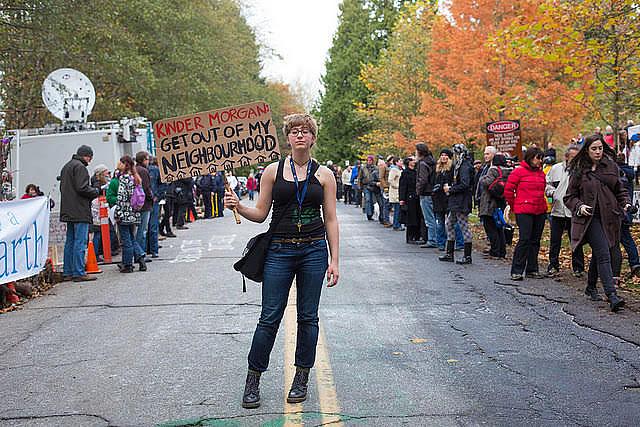Are local communities bearing the brunt of the shift to heavier crude oil?

Protesters at a rally against the planned Kinder Morgan tar sands pipeline in British Columbia.
While the Standing Rock Sioux Tribe organizes against the Dakota Access pipeline, and Trump has vowed to resurrect the contested Keystone XL pipeline, a similar debate about the oil industry is taking place in the San Francisco Bay Area that could severely impact the health of its residents.
All of these debates have something in common — they’re fueled by a major shift in the oil industry. As the sources for “conventional” crude oil are running out, the U.S. has turned its attention to heavier crude oil found in landlocked places like the Alberta tar sands and Bakken oil fields. Plus, new advances in technology like hydraulic fracturing or “fracking” have allowed us to extract this oil in quantities like never before. The extraction, transportation and refining of this cruder oil has huge health and safety implications.
The Bay Area is home to five oil refineries. It’s the second largest oil-refining center on the west coast of North America. And as the overall industry shifts, the Bay Area refineries are gearing up to receive and process an increasing amount of Tar Sands, Bakken and other heavy crude oils.
Residents in towns like Richmond, California, right next to an oil refinery, have long been disproportionately affected by the health impacts of the oil industry. If more tar sands and heavy crude oil come into the Bay Area, these health impacts will increase dramatically. According to the Natural Resources Defense Council, the refining of tar sands oil produces two to three times more greenhouse gas emissions, as well much higher concentrations of heavy metals, chemicals, and particulate matter than conventional crude oil. These byproducts are carcinogenic and can cause respiratory illnesses.
There is also the question of how to transport the oil to the Bay Area. Because most of the refineries that can process this heavy oil are on the coast, the industry has had to figure out how to get the oil from the middle of the country out to the refineries. It has begun transporting the crude oil on trains. This has huge safety implications. These heavy crude oils are extremely volatile. Because the railways cut right through many residential areas, some residents are calling this system a “bomb on wheels.” More than 24 derailments have occurred in the U.S. and Canada since 2013, resulting in fires, oil spills, and the evacuation of towns. One train in Quebec exploded in 2013 and killed 47 people.
Community and environmental groups at the end of this proverbial pipeline are resisting these changes to the oil industry. Local groups are pushing the Bay Area Air Quality Management District to cap the Bay Area refineries’ greenhouse gas emissions and its resulting air pollutants. The cap could effectively block the refineries’ ability to process tar sands and other heavy crudes. That could stop the need for crude oil to enter the Bay Area by train.
The ruling would also set an interesting precedent for the entire state. California has lowered greenhouse emissions statewide with its “cap and trade” climate change policy. But there are no local regulations on greenhouse gas emissions. So while the entire state has reduced its emissions, in specific “hotspots” like Richmond, emissions have actually gone up. The state assembly recently passed new legislation that encourages policymakers to take into account the disproportionate environmental health impacts of climate change on specific communities. Environmental groups are hoping that this new policy will influence the Air Quality District to set a local emissions cap at Bay Area refineries.
Bay Area residents are also contesting a railroad project to their south, in San Luis Obispo. The Phillips 66 oil company there proposed extending train tracks into their refinery so they could receive crude oil by rail. Bay Area community groups are opposing the project because the oil trains would move through the Bay Area, past homes and schools, on their way south to San Luis Obispo.
The United States is changing where it gets its oil and there are serious health implications that come with this. The Bay Area presents an opportunity to examine these health impacts in-depth — and explore how a changing oil industry that stretches across the continent is acutely affecting communities nearest the refineries.
What exactly are the health impacts of refining tar sands and other heavy crude oil? What happens when national shifts in the oil industry have very local health impacts? And how much say do local communities have about the international industries that are located in their own backyard? These are some of the key questions I’ll explore in my reporting for the 2017 California Fellowship.
